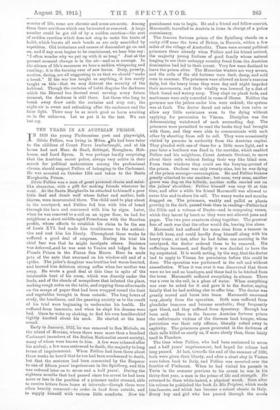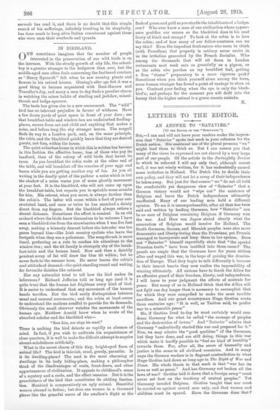TEN YEARS IN AN AUSTRIAN PRISON.
IN 1820 the young Piedmontese poet and playwright, Silvio Pellico, was living in Milan. 411e had been tutor to the children of Count Porro lambertenghi, and at his Lcuse had met Mme. de Stool, &Allege!, Brougham, Hob- house, and Lord Byron, It was perhaps hardly surprising that the Austrian secret police, always very active in their search for political malcontents among the professional classes, should suspect Pellico of belonging to the Carbonari. He was arrested on October 13th and taken to the Santa 2clargherita Prison.
Silvio Pellicle was a man of great personal charm and saint- like character, with a gift for making friends wherever he went. At the Santa Margherita he attached to himself a poor little deaf and dumb waif whose father and mother, both thieves, were incarcerated there. The child used to play about in the courtyard, and Pellico fed him with bits of bread through the bars and conversed with him by signs. Later, when he was removed to a cell on an upper floor, he had for neighbour a stout middle-aged Frenchman with the Bourbon profile, whose efforts to establish his claim to be the son of Louis XVI. had made him troublesome to the authori- ties and cost him his liberty. -Throughout these weeks he suffered a good deal of suspense. During his trial his chief fear was that he might inculpate others. Sentence was deferred,sand he was sent to Venice and lodged in the Piembi Prison in the Piazza San Marco. Here he made pets of the ants that swarmed on his window-sill and of a tpider. The jailer's daughter was bruttina but warm-hearted, and brewed him delicious strong coffee when her mother was away. He wrote a good deal at this time in spite of the intolerable heat of his room, which was directly under the leads, and of the clouds of mosquitoes that infested the place, making rough notes on the table, and copying them afterwards on the scraps of paper that had been wrapped round the fruit and vegetables brought in from outside. The long hours of study, the loneliness, and the gnawing anxiety as to the result of his trial were beginning to undermine his health. He suffered from insomnia, and when he slept his dreams were bad. Once he woke up choking, to find his own handkerchief tightly knotted about his neck. He started at the least sound.
Early in January, 1822, he was removed to San Michele, on the island of Murano, where there were more than a hundred Carbonari (members of the Italian Nationalist secret society), many of whom were known to him. A few were released after he arrival; a few were sentenced to death, the majority to long terms of imprisonment. When Pellico had been there about three weeks he heard that he too had been condemned to death, but that the sentence had been commuted by the Emperor to one of fifteen years' imprisoment in the Spielberg, and this was reduced later on to seven and a bull years'. Dux:ing the eighteen mouths that had passed since his arrest he had been more or less in the position of a prisoner under remand, able to receive letters from home at intervals—though these were often heavily censoeed—to order in food from outside, and to supply himself with various little comforts. Now his punishment was to begin. He and a friend and fellow-convict, Maronoelli, travelled to Austria in irons in charge of a police commissary.
The famous fortress prison of the Spielberg stands on a rocky cliff near the town of Bruno, in Moravia, within a few miles of the village of Austerlitz. There were several political prisoners there already when Pellico and his friend arrived, the majority young Italians of good family whose natural longing to see their unhappy country freed from the Austrian domination bad led to their arrest. Very few were'destined to leave the prison alive. The Moravian winters are very severe, and the cells of the old fortress were dark, damp, and cold even in summer. The prisoners were allowed an hour's exercise daily, but the heavy irons they wore day and night impeded their movements, and their vitality was lowered by a diet of black bread and watery soup. They slept on plank beds, and mattresses were only conceded in cases of illness. Neither the governor nor the jailers under him were unkind; the system was at fault The doctor dared not relax the iron rules or allow any little assistance even to the dying without applying for permission to Vienna. Discipline was the dehumanizing watchword of each succeeding day. The prisoners were permitted to read the books they had brought with them, and they were able to communicate with each other by shouting from cell to cell. They were occasionally visited by persons in authority from the Austrian capital. They pleaded with one of these for a little more light, and a year later a lant horn was fixed in the corridor, which enabled Pellico and his neighbour, Count Antonio Oroboni, to move about their cells without feeling their way like blind men. From their windows they could see the burying-ground of the prison. Oroboni was only twenty-nine, but he was dying of the prison scourge—coneumption. He and Pellico became greatly attached to one another; but soon, very soon, another grave was dug on the hillside, another coffin carried out on the jailers' shoulders. Pellieo himself was very ill at this time, and after a while his friend Maroncelli was allowed to nurse him and to share his cell. The weary weeks and months dragged on. The prisoners, weakly and pallid as plants growing in the dark, passed their time in reading—Pellico had the Bible and a volume of Dante—and in composing verses, which they learnt by heart as they were not allowed pens and paper. The two poor creatures clung together. The greatest fear of each was that the other would die, leaving him alone.
Maroncelli had suffered for some ,time from a tumour in the left knee, and could hardly drag himself along with his heavy irons; at last, after he bad fallen one morning in the courtyard, the doctor ordered them to be removed. His sufferings increased, and finally it was decided to have the leg amputated. It is worth noting, by the way, that the doctor had to apply to Vienna for permission before this could be done. The operation was performed in the cell and without anaestbetics. When it was over it was discovered that there were no ice and no bandages, and these had to be fetched from the town. llaronceili suffered everything in silence. There was a rose in the cell, in a glass of water. When everything was over he asked for it and gave it to the doctor, saying faintly that be had nothing else to offer him. The doctor was greatly moved and burst into tears. Maronoelli recovered very,,elowly from the operation. Both men suffered from glandular tumours and became scorbutic; they frequently spat blood, and they suffered from dysentery. Enough has been said. Here in the famous Austrian fortress prison the unfortunate victims of the German land hunger, whose patriotism was their only offence, liberally rotted away in captivity. The poisonous gases generated in the darkness of their cells killed as surely as, if more slowly than, those lately used in Flanders.
The time when Pellico, who had been sentenced to seven and a half years' imprisonment, had hoped for release had long passed. At last, towards the end of the summer of 1830, both were given their liberty, and after a short stay in Vienna were taken back to Italy, and Pellico was escorted over the frontier of Piedmont When he had visited his parents in Turin. in the summer previous to his erred he was in his thirty-first year, a man in the prime of life and strength. He returned to them white-haired, a physical wreak. Soon after his release he published the book Le 11E6 Prigioni, which made him famous, and which has become a school °lassie in Italy. Every boy and girl who has passed through the scuo/ct wormide has read it, and there is no doubt that this simple record of his, sufferings, infinitely touching in its simplicity, has done much to keep alive Italian resentment against those who Were once their overlords and tyrants.



































 Previous page
Previous page